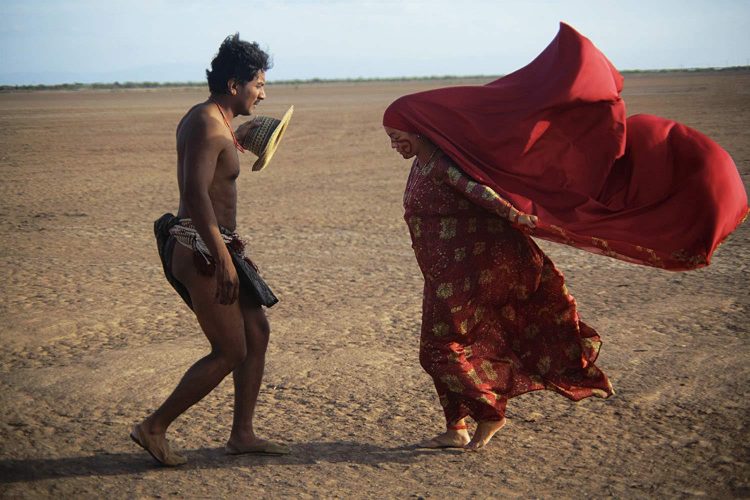
Directors Cristina Gallego and Ciro Guerra shoot the opening, the repeated prayer leading into a tribal dance for the courtship of Zaida, with a mournful solemnity. Paired with those opening words, the film feels adamant in preparing its audience for imminent tragedy. Zaida, and her mother Ursula, are part of the indigenous Wayuu tribe in the La Guajira state in Colombia. Zaida’s repeated words are a promise of sorts; everything hinges on that important word if. What happens when ways of life and traditions are lost? That question is the central thesis of “Birds of Passage,” a crime drama where every second feels suffused with an overwhelming sense of the foreboding.
Late last year, film audiences were invited to consider the historical and postcolonial context of the indigenous people in Latin America when Alfonso Cuarón’s “Roma” premiered and charmed many. Like “Roma”, “Birds of Passage” premiered at the end of year film festivals as a prospective Foreign Language Film contender. Despite making the December shortlist, it did not secure a nomination. It premiered at a handful of theatres in North America earlier in the year and is now available for streaming. Halfway into 2019, it’s one of the most searing film experiences of the year. “Birds of Passage” feels as essential and vital as the best of cultural critiques as it delivers a searing rumination on indigenous lives and the postcolonial malaise of the region. The film traces the change to culture and tradition as this indigenous tribe becomes embroiled and then felled by their involvement in the burgeoning drug trade in Colombia over the course of two decades, from the 1960s into the 1980s. It begins with the courtship ritual at the start of the film. Lovely Zaida catches the eye of sombre Rapayet. Rapayet must pay the bride price and a chance encounter with some stray American tourists and their love for marijuana prompts a serendipitous opportunity to earn some money. Serendipity soon gives way to excess then to violence and then to tragedy, and it’s all foreshadowed by that first dance the Rapayet and Zaida perform. The camera follows the two characters, dancing in circles, surrounded by onlookers. They move faster and faster, almost to dizzying effect, as if they are bound to fall. They don’t. And it’s that nimble balance that sees Gallego and Guerra balancing an excess of familiar tropes and varying plot strands to deliver a beguiling dance of fate. The plot elements seem negligible. We are familiar with this sort of crime story. And even if we cannot guess the particulars, we suspect the generalities of where this will go. Freed from that need to deliver surprises, the directorial pair use the script from Maria Camila Arias and Jacques Toulemonde Vidal to create an aesthetic that resembles a waking dream as the film goes on. The film is delivered in five chapters, each centred on a portentous moment. Rapayet woos Zaida and gets involved in the drug trade. Ursula, the matriarch of the tribe contemplates the future of her family. Success gives way to greed. It’s not the what, though, it’s the how that marks the film and even more than the how, it’s the who. The description of the film as an indigenous “Godfather” annoys not just because of its inaccuracy (all crime families are not the Corleone family) but because it misses the vital point the film makes in examining how culture can be sacrificed for progress.
Just like in “Roma,” a more thoughtful historical consideration of the region reveals layers of postcolonial context within reach. The Wayuu family survived the genocide wrought on the indigenous tribe by the Spanish years ago. Now, centuries later a chance encounter with some Americans (the neo-colonialists of the 20th century) precipitate another potential erasure. There’s an amusing irony in the way the Americans are introduced in the film, with an almost clueless credulity. Of course, we know what Rapayet and his family don’t, that the appearance of ignorance won’t prevent the damage that they can do. And, so, “Birds of Passage” seems to challenge us with the question of what happens when we let outsiders in. For good, and for ill.
“Birds of Passage” is a requiem for a lost way of life. The film signals its intentions from its opening and so we must watch, and wait, unable to interrupt the methodical movement of time or to amend the horrifying results of its march. The meanderings of greed, hate, revenge, and desolation are universal in their reach, but it’s the specific Colombian imagery and the precise awareness of indigenous culture that gives the film its heightened nuance. And this is the nuance that makes it not just a compelling foray into crime on screen, but essential viewing in 2019. At the end of the film, an indigenous song is repeated. Some of the lines emphasis the mournful tone: “Strong winds are coming now. / They’ll erase our footprints on the sand. / That’s why I sing on this day.” Indeed the strong winds are coming. Are they the foreigners? New ways of living? Changing times? Yes to all, maybe. But Guerra and Gallego seem more accusatory with their lensing. Really, the strong winds are us. We are the rot, giving way to our own erasure. “Birds of Passage” is a heartrending indictment of our own selfish folly.
“Birds of Passage” is available for streaming on AmazonVideo.
